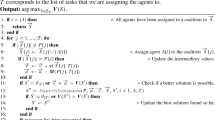Abstract
We propose a multi-agent system that enables groups of agents to collaborate and work autonomously to execute tasks. Groups can work in a decentralized manner and can adapt to dynamic changes in the environment. Groups of agents solve assigned tasks by exploring the solution space cooperatively based on the highest reward first. The tasks have a dependency structure associated with them. We rigorously evaluated the performance of the system and the individual group performance using centralized and decentralized control approaches for task distribution. Based on the results, the centralized approach is more efficient for systems with a less-dependent system \(G_{18}\) (a well-known program graph that contains 18 nodes with few links), while the decentralized approach performs better for systems with a highly-dependent system \(G_{40}\) (a program graph that contains 40 highly interlinked nodes). We also evaluated task allocation to groups that do not have interdependence. Our findings reveal that there was significantly less difference in the number of tasks allocated to each group in a less-dependent system than in a highly-dependent one. The experimental results showed that a large number of small-size cooperative groups of agents unequivocally improved the system’s performance compared to a small number of large-size cooperative groups of agents. Therefore, it is essential to identify the optimal group size for a system to enhance its performance.
Access this chapter
Tax calculation will be finalised at checkout
Purchases are for personal use only
Similar content being viewed by others
References
Agrawal, P., Rao, S.: Energy-aware scheduling of distributed systems. IEEE Trans. Autom. Sci. Eng. 11(4), 1163–1175 (2014). https://doi.org/10.1109/TASE.2014.2308955
Bian, Y., Sun, Y., Zhai, M., Wu, W., Wang, Z., Zeng, J.: Dependency-aware task scheduling and offloading scheme based on graph neural network for MEC-assisted network. In: 2023 IEEE/CIC International Conference on Communications in China (ICCC Workshops), pp. 1–6 (2023). https://doi.org/10.1109/ICCCWorkshops57813.2023.10233785
Du, J., Ling, Z., Peng, Q., Zhen, S., Yang, L.: Task allocation in multi-agent systems with swarm intelligence of social insects. In: 2010 Sixth International Conference on Natural Computation, vol. 8, pp. 4322–4326 (2010). https://doi.org/10.1109/ICNC.2010.5583611
Gerkey, B.P., Matarić, M.J.: A formal analysis and taxonomy of task allocation in multi-robot systems. Int. J. Robot. Res. 23(9), 939–954 (2004). https://doi.org/10.1177/0278364904045564
Ghassemi, P., DePauw, D., Chowdhury, S.: Decentralized dynamic task allocation in swarm robotic systems for disaster response: extended abstract. In: 2019 International Symposium on Multi-Robot and Multi-Agent Systems (MRS), pp. 83–85 (2019). https://doi.org/10.1109/MRS.2019.8901062
Gudu, D., Hardt, M., Streit, A.: On mas-based, scalable resource allocation in large-scale, dynamic environments. In: 2016 Intl IEEE Conferences on Ubiquitous Intelligence & Computing, Advanced and Trusted Computing, Scalable Computing and Communications, Cloud and Big Data Computing, Internet of People, and Smart World Congress (UIC/ATC/ScalCom/CBDCom/IoP/SmartWorld), pp. 567–574 (2016). https://doi.org/10.1109/UIC-ATC-ScalCom-CBDCom-IoP-SmartWorld.2016.0097
Karishma, Rao, S.: Cooperative solutions to exploration tasks under speed and budget constraints. J. Simul. 17(6), 676–687 (2023). https://doi.org/10.1080/17477778.2022.2043792
Li, J., Tinka, A., Kiesel, S., Durham, J.W., Kumar, T.K.S., Koenig, S.: Lifelong multi-agent path finding in large-scale warehouses. In: Proceedings of the AAAI Conference on Artificial Intelligence, vol. 35, no. 13, pp. 11272–11281 (2021)
Luo, H., Hu, X.J., Hu, X.X.: Multi agent negotiation model for distributed task allocation. In: 2010 2nd IEEE International Conference on Information Management and Engineering, pp. 54–57 (2010). https://doi.org/10.1109/ICIME.2010.5477615
Macarthur, K.: Multi-agent coordination for dynamic decentralised task allocation. Ph.D. thesis, University of Southampton (2011)
Ramchurn, S.D., Farinelli, A., Macarthur, K.S., Jennings, N.R.: Decentralized coordination in RoboCup rescue. Comput. J. 53(9), 1447–1461 (2010). https://doi.org/10.1093/comjnl/bxq022
Ramchurn, S.D., Polukarov, M., Farinelli, A., Truong, C., Jennings, N.R.: Coalition formation with spatial and temporal constraints, pp. 1181–1188. International Foundation for Autonomous Agents and Multiagent Systems, Richland (2010)
Shehory, O., Kraus, S.: Methods for task allocation via agent coalition formation. Artif. Intell. 101(1), 165–200 (1998). https://doi.org/10.1016/S0004-3702(98)00045-9
Shen, Y.: Bionic communication network and binary pigeon-inspired optimization for multiagent cooperative task allocation. IEEE Trans. Aerosp. Electron. Syst. 58(5), 3946–3961 (2022). https://doi.org/10.1109/TAES.2022.3157660
Wang, W., Jiang, Y.: Community-aware task allocation for social networked multiagent systems. IEEE Trans. Cybern. 44(9), 1529–1543 (2014). https://doi.org/10.1109/TCYB.2013.2289327
Zheng, X., Koenig, S.: Reaction functions for task allocation to cooperative agents. In: Proceedings of the 7th International Joint Conference on Autonomous Agents and Multiagent Systems, AAMAS 2008, vol. 2, pp. 559–566. International Foundation for Autonomous Agents and Multiagent Systems, Richland (2008)
Author information
Authors and Affiliations
Corresponding author
Editor information
Editors and Affiliations
Rights and permissions
Copyright information
© 2025 The Author(s), under exclusive license to Springer Nature Switzerland AG
About this paper
Cite this paper
Karishma, Rao, S. (2025). Cooperative Task Execution in Multi-agent Systems. In: Mathieu, P., De la Prieta, F. (eds) Advances in Practical Applications of Agents, Multi-Agent Systems, and Digital Twins: The PAAMS Collection. PAAMS 2024. Lecture Notes in Computer Science(), vol 15157. Springer, Cham. https://doi.org/10.1007/978-3-031-70415-4_12
Download citation
DOI: https://doi.org/10.1007/978-3-031-70415-4_12
Published:
Publisher Name: Springer, Cham
Print ISBN: 978-3-031-70414-7
Online ISBN: 978-3-031-70415-4
eBook Packages: Computer ScienceComputer Science (R0)




